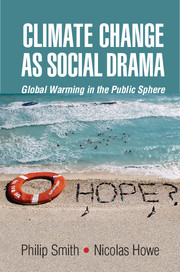Book contents
- Frontmatter
- Contents
- Acknowledgments
- 1 Introduction: The Problem of Climate Change
- 2 Climate Change as Social Drama
- 3 Narrating Global Warming
- 4 An Inconvenient Truth: The Power of Ethos
- 5 Climate Change Art: An Illustrative Failure?
- 6 Climategate and Other Controversies
- 7 The Climate Conference as Theatre
- 8 Local Dramas: The Places of Climate Change
- 9 Conclusion: The Show Must Go On
- References
- Index
3 - Narrating Global Warming
Published online by Cambridge University Press: 05 May 2015
- Frontmatter
- Contents
- Acknowledgments
- 1 Introduction: The Problem of Climate Change
- 2 Climate Change as Social Drama
- 3 Narrating Global Warming
- 4 An Inconvenient Truth: The Power of Ethos
- 5 Climate Change Art: An Illustrative Failure?
- 6 Climategate and Other Controversies
- 7 The Climate Conference as Theatre
- 8 Local Dramas: The Places of Climate Change
- 9 Conclusion: The Show Must Go On
- References
- Index
Summary
Scientists usually think of climate change as a material process that requires technology if it is to be understood. With thermometers, satellite systems, weather balloons, and consequent computer modeling, they can come to terms with the chemical and physical process through which the planet heats up. They can measure and predict shifts in rainfall, in extreme weather, and in glacial ice distributions. Scholars involved in political science and social policy analysis look closely at practical human responses to risks. For example, they might explore resource conflicts or the impact of initiatives designed to down our harmful emissions. In the previous chapter we set out another way of seeing climate change. This is to take it not only as the product and producer of social outcomes but also as a meaningful social fact. Climate change is something more than a process involving molecules, energies, oceanic currents and solar radiation, human impacts upon nature, and policy responses. It is also a complex cultural field. To make sense of this qualitatively different, non-material dimension of its existence, the approach of cultural sociology is needed.
From the perspective of cultural sociology the natural event of climate change is subject to communicative translation via binary codes, deeply grounded myths, parables, images, characters, performances, and rituals. Together they add up to the social drama of climate change in which legitimacy is contested, moral authority gained, and public opinion formed. In this chapter we begin our empirical investigations by giving emphasis to one Aristotelian theme to this process: genre. In his Poetics Aristotle achieved a major breakthrough by recognizing and documenting the deep structural similarities that underpin various narratives and that lead them to constitute a recognizable genre. Recent work in cultural sociology has built on this insight in three ways that are crucial to our inquiry.
- Type
- Chapter
- Information
- Climate Change as Social DramaGlobal Warming in the Public Sphere, pp. 50 - 70Publisher: Cambridge University PressPrint publication year: 2015

